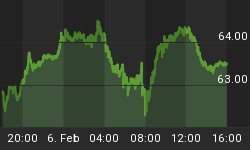Gold Gains as "Historic" Bond-Market Action Threatens "Dollar Collapse"
THE PRICE OF GOLD rose $6 early Thursday to record the best AM Gold Fix in London so far this week, hitting $949.75 an ounce as world stock markets fell and US government bonds bounced from their worst sell-off since January.
The Gold Price in Sterling bounced 1.2% from yesterday's 5-month low of £591 an ounce.
For Eurozone investors now Ready to Buy Gold, the price rose above last week's close at €686.
Japanese Gold Futures touched their best level in two months above ¥2,975 per gram.
"People are fearful again that we could be facing a Dollar collapse, which would have severe ramifications across the board," says Robin Bhar at Calyon Bank in London, speaking to Reuters.
"All the factors that people have been warning about for several months now seem to be coming to the fore."
"What I think we're seeing here," says TD Ameritrade's James Grady to the New York Times, "is flat-out concern about the amount of debt the government's going to be issuing.
"People are realizing they don't want to own bonds."
European bond prices slipped Thursday morning after mixed data showed economic confidence rising in the 16-nation Eurozone, but consumer and industrial confidence falling once more.
US Treasury bonds bounced meantime - pushing the yield offered to new buyers lower - after what several professional traders called a "historic" day in the bond market.
"The yield curve is losing its curve and is about to go perpendicular," says retired bond trader John Jansen in his Across the Curve blog after 30-year Treasuries sank on Wednesday, pushing the yield to 4.59% - its highest level since August last year.
Short-dated US bonds held steady, in contrast, meaning that the "spread" (or gap) between 2-year and 30-year yields ended Wednesday at 3.56% basis points.
While that means US banks can earn a near-record spread by borrowing short-term and lending long-term, "Fundamentals in the housing market are weak enough without having [mortgage] affordability take a turn for the worse," notes the Accrued Interest blog.
"The Fed can't keep mortgage rates at or below 5% with the Treasury market where it is. Can't happen...[But Fed chairman Ben Bernanke] is just using the Treasury market as his helicopter. He's not actually trying to push yields lower."
Tuesday saw the yields offered by US mortgage bonds rise back above last Nov.'s levels, before the Federal Reserve began buying home-loan securities.
Now the US central bank "may step up asset purchases" again says Bloomberg, citing Fed officials, pumping fresh money into the economy and further swelling its $2.1 trillion balance-sheet.
"[Private] domestic US holdings of Treasuries are actually quite low relative to US GDP," says Brad Setser in his Follow the Money blog for the Council on Foreign Relations.
"My guess though is that [foreign] central banks' shift toward shorter maturities has had an impact on the market."
Crude oil held above $63 per barrel, but base metals and soft commodities fell back.
The Chinese and Hong Kong stock markets were closed for the Duangwu "dragon boat" festival, but holding near 6.82 to the Dollar since last July, the Chinese Yuan ticked back as the US currency rose against all major world currencies.
"I want to make it very clear that the negative [ratings] outlook on the UK is not a secret message to Washington," said Moritz Kraemer, head of European bond analysis at Standard & Poor's today, when asked about last week's "negative" outlook on British gilts.
"If we wanted to talk about the US then we'd talk about the US."
Here in London today, UK financial watchdog the FSA reported that its "stress tests" of domestic bank balance sheets used a scenario "more severe" that any recession since World War II.
The FSA's tests assumed an economic contraction of 6%, unemployment over 12%, a halving of house prices and a 60% drop in commercial real estate prices.
But "The thing is," notes Sandy Chen at brokers Panmure Gordon, speaking to Bloomberg, "the FSA assumptions are not far off some economists forecasts. So this will not end the concerns about whether banks have enough capital to absorb potential losses."
Following the much-publicized "stress tests" of America's largest 19 banks earlier this month, the US authorities yesterday warned of 305 "problem" banks, holding a total of $220 billion in assets.
That compares with 252 banks under watch at the end of last year, then holding $159.4bn between them.
Commenting on the imminent bankruptcy at General Motors, meantime - which yesterday failed to agree a debt-for-equity swap with bondholders - the biggest losers "will be Main Street" says a lawyer acting for both Chrysler and GM creditors.
"The 'bad guys' in Chrysler were hedge funds, who Obama called 'speculators'. Here they're individual retirees who bought bonds when they were like Gold Bullion."















